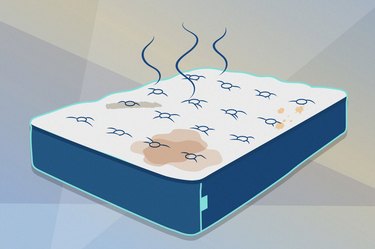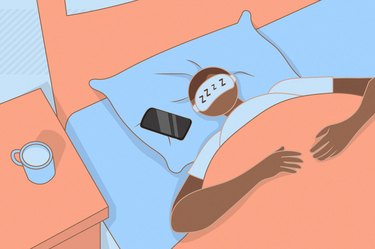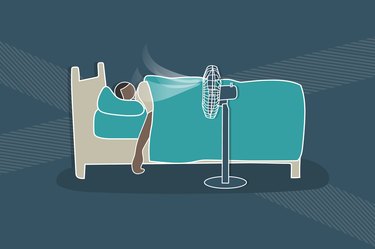
Popping some Zzzquil when you're tossing and turning can help you fall asleep fast, so you're rested and refreshed in the morning. But should you be taking it all the time? What are the side effects of taking Zzzquil every night?
Over-the-counter sleep aids, while helpful in the short run, aren't intended for long-term use. Here are the possible long-term effects of Zzzquil and the alternatives you can try to help you get a good night's sleep without the risks.
Video of the Day
Video of the Day
First, What's In Zzzquil?
Zzzquil contains the active ingredient diphenhydramine, an antihistamine that can help relieve occasional sleeplessness.
"It is indicated for short-term difficulty falling asleep and is usually less effective for staying asleep," explains Sudha Tallavajhula, MD, sleep neurologist with UTHealth Houston and Memorial Hermann.
Diphenhydramine works against histamine, a chemical produced in the central nervous system, which can cause a feeling of drowsiness, according to the Mayo Clinic.
It's also found in allergy medicines like Benadryl and combination sleep aids/pain relievers including Motrin PM, Excedrin PM, Robitussin Nighttime Cough and Cold, Sudafed PE Day/Night Cold and Unisom with Pain Relief.
How Long Can You Take Zzzquil?
Zzzquil and other sleep medications containing diphenhydramine are meant to provide short-term relief for temporary sleep problems, not as a treatment for insomnia.
"Diphenhydramine is indicated for occasional use for a few days at a time," Dr. Tallavajhula says.
Long-Term Effects of Zzzquil
Zzzquil is generally considered safe for short-term use when taken as directed. But taking it every night can cause problems, which is why the American Academy of Sleep Medicine recommends against using the drug to treat chronic sleep issues.
1. You Could Develop a Tolerance
Over time, you'll develop a tolerance to the med, so it becomes less effective.
"Medications like diphenhydramine are notorious for inducing tolerance," Dr. Tallavajhula says. "Unfortunately, it results in patients taking increasingly higher doses, which after a point are also no longer effective."
2. You Might Feel Dizzy or Groggy
Taking higher doses can put you at higher risk for negative side effects, Dr. Tallavajhula says, including dry mouth, dizziness and daytime grogginess.
3. You Could Have Rebound Insomnia
If you take Zzzquil for a while and then stop suddenly, your sleep problems will likely come back even worse than before, notes the Cleveland Clinic.
4. It Could Keep You From Getting Treated for a Real Sleep Issue
Regularly needing diphenhydramine or another sleep aid to doze off could also mean you have an underlying sleep problem that isn't being addressed, like insomnia or sleep apnea. (The same goes for natural sleep aids like melantonin, by the way.)
These problems "can cause downstream consequences and can effectively be treated by evidence-based methods under the guidance of a physician," Dr. Tallavajhula says.
Warning
Avoid taking Zzzquil (or any medication with diphenhydramine) with alcohol or other sedatives, because this can increase the risk for harmful side effects.
Who Should Not Take Zzzquil?
Zzzquil and other medications containing diphenhydramine aren't safe for everyone.
The drug may increase the risk of dementia for adults over 65 and cause heightened side effects like agitation, dizziness, nausea, constipation, dry mouth or headache, per the Cleveland Clinic.
People who are pregnant or breastfeeding should also steer clear, and those with the following conditions:
- Glaucoma
- Peptic ulcer
- Urinary retention
Alternatives to Taking Zzzquil
Better sleep starts with healthy nighttime habits and a solid bedtime routine. This includes the following, per the Centers for Disease Control and Prevention:
- Get on a consistent sleep schedule: Go to bed at the same time each night and wake up around the same time each morning (even on the weekends).
- Create a bedroom environment that supports sleep: Make sure your room is dark, quiet and cool (the ideal temperature for sleeping is around 65 degrees).
- Avoid electronics before bedtime: Turn off your computer, phone and TV an hour or two before lights out.
- Nix caffeine and alcohol in the afternoon and evening: Both can make it harder to fall asleep and stay asleep.
- Watch what you eat for dinner (and when): Avoid large meals close to bedtime.
- Move more: Get some exercise during the day.
If those things aren't getting the job done and you're reaching for an over-the-counter sleep aid more than once in a while, it's worth talking to your doctor, Dr. Tallavajhula says. Together, you can talk about your symptoms to figure out what might be getting in the way of a good night's sleep.
So, How Bad Is It Really to Take Zzzquil Every Night?
It's fine to take Zzzquil or other meds containing diphenhydramine on the occasional night when you're struggling to get to sleep. But relying on it regularly can make it less effective, plus it could mean you're using it to manage a problem that requires a different plan of attack.
"If you feel the need to take it every day, it is time to visit a sleep medicine physician to evaluate the underlying sleep disorder and start targeted treatment," Dr. Tallavahula says.
- Mayo Clinic: "Is it OK to use over-the-counter antihistamines to treat insomnia? I'd like to avoid prescription sleep aids."
- Harvard Health Publishing: "Drugstore sleep aids may bring more risks than benefits"
- Cleveland Clinic: "Sleeping Pills"
- American Journal of Lifestyle Medicine: "Cognitive-Behavioral Therapy for Insomnia: An Effective and Underutilized Treatment for Insomnia"
- Centers for Disease Control and Prevention: "Tips for Better Sleep"
Was this article helpful?
150 Characters Max
0/150
Thank you for sharing!
Thank you for your feedback!
Is this an emergency? If you are experiencing serious medical symptoms, please see the National Library of Medicine’s list of signs you need emergency medical attention or call 911.



